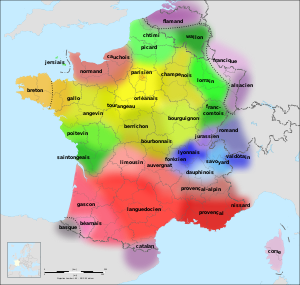
Back Sprachen in Frankreich ALS لغات فرنسا Arabic Llingües de Francia AST Fransa dilləri Azerbaijani ফ্রান্সের ভাষা Bengali/Bangla Llengües de França Catalan Sprachen in Frankreich German Lingvoj en Francio Esperanto Lenguas de Francia Spanish Frantziako hizkuntzak Basque
| Languages of France[1] | |
|---|---|
 Languages and dialects of metropolitan France | |
| Official | French |
| Regional | Alsatian; Catalan; Basque; Corsican; Breton; Gallo; Occitan; some Walloon; West Flemish; Franco-Provençal; Savoyard; Lorraine Franconian; French Guiana Creole; Guadeloupean Creole; Martiniquan Creole; Oïl languages; Réunion Creole; some twenty languages of New Caledonia, Yenish, the Maroon creoles and Amerindian languages of French Guiana |
| Immigrant | Arabic, Portuguese, Spanish, Italian, German, Polish, Berber, Turkish, English, Vietnamese[2] |
| Foreign | English (39%) Spanish (13%) German (6%)[3] |
| Signed | French Sign Language |
| Keyboard layout | |
| Part of a series on the |
| Culture of France |
|---|
| People |
| Mythology and folklore |
| Cuisine |
| Festivals |
| Religion |
| Music and performing arts |
| Sport |
Of the languages of France, French is the sole official language according to the second article of the French Constitution. French, a Gallo-Romance language, is spoken by nearly the entire population of France.
In addition to French, several regional languages are also spoken to varying degrees, such as Alsatian, a German dialect (specifically Alemannic; spoken by 1.44% of the national population); Basque, a language isolate; Breton, a Celtic language (spoken by 0.61%); Corsican, an Italo-Dalmatian language; and various other Gallo-Romance languages (Langues d'oïl 1.25%, Occitan 1.33%). Some of these languages are also spoken in neighbouring countries, such as Belgium, Germany, Switzerland, Italy, Andorra, or Spain.
- ^ "Europeans and their Languages" (PDF). Ec.europa.eu. Retrieved 2015-03-30.
- ^ "La dynamique des langues en France au fil du XXe siècle" (PDF) (in French). Ined.fr. Retrieved 2015-03-30.
- ^ "SPECIAL EUROBAROMETER 386 Europeans and their Languages" (PDF). ec.europa.eu. Archived from the original (PDF) on 2016-01-06.

